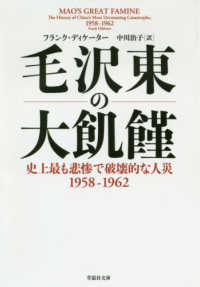Full Description
For nearly 40 years researchers have been using narratives and stories to understand larger cultural issues through the lenses of their personal experiences. There is an increasing recognition that autoethnographic approaches to work and organizations add to our knowledge of both personal identity and organizational scholarship. By using personal narrative and autoethnographic approaches, this research focuses on the working lives of individual people within the organizations for which they work.
This international handbook includes chapters that provide multiple overarching perspectives to organizational autoethnography including views from fields such as critical, postcolonial and queer studies. It also tackles specific organizational processes, including organizational exits, grief, fandom, and workplace bullying, as well as highlighting the ethical implications of writing organizational research from a personal narrative approach. Contributors also provide autoethnographies about the military, health care and academia, in addition to approaches from various subdisciplines such as marketing, economics, and documentary film work.
Contributions from the US, the UK, Europe, and the Global South span disciplines such as organizational studies and ethnography, communication studies, business studies, and theatre and performance to provide a comprehensive map of this wide-reaching area of qualitative research. This handbook will therefore be of interest to both graduate and postgraduate students as well as practicing researchers.
Winner of the 2021 National Communication Association Ethnography Division Best Book Award
Winner of the 2021 Distinguished Book on Business Communication Award, Association for Business Communication
Contents
List of Figures
List of Tables
Acknowledgements
Preface: Organizing a Handbook and What's Inside
Andrew F. Herrmann
Section I: Situating Organizational Autoethnography
1. The Historical and Hysterical Narratives of Organization and Autoethnography
Andrew F. Herrmann
2. Life between Interlocking Oppressions: An Intersectional Approach to Organizational Autoethnography
Helena Liu
3. Autoethnography through the Prism of Foucault's Care of the Self
Leah Tomkins
4. Queering Organizational Research Through Autoethnography
Jamie McDonald and Nick Rumens
5. Postcolonial Organizational Autoethnography: Journey into Reflexivity, Erasures, and Margins
Mahuya Pal, Beatriz Nieto Fernandez, and Nivethitha Ketheeswaran
6. Aggression, Bullying and Mobbing in the Workplace: An Autoethnographic Exploration
Mpho M. Pheko, Thabo L. Seleke, Joy Tauetsile, and Motsomi N. Marobela
Section II: Autoethnography Across Organizational Disciplines
7. On Not Seeing Myself in the Research on Veterans
Jeni R. Hunniecutt
8. Navigating the Narrow Spaces: A Critical Autoethnography of Life in the (Postmodern) Neoliberal University
Christopher N. Poulos
9. Autoethnography and Information Technology
Niamh Riordan
10. Organizational Autoethnographies of Economy, Finance, Business and Management: Reflections and Possibilities
Jeff Hearn, Karl-Erik Sveiby, and Anika Thym
11. The Discomfort of Autoethnography in Academic Marketing Research
Chris Hackley
Section III: Organizations and Organizing
12. Billable (H)ours: Autoethnography, Ambivalence, and Academic Labor in a Healthcare Organization
Nicole Defenbaugh, Jay Baglia, and Elissa Foster
13. Birthing Autoethnographic Philanthropy, Healing, and Organizational Change: That Baby's Name
Abby Lackey
14. Organizing Desire: The Queer Bar
Tony E. Adams
15. Polypreneur: An Autoethnography of Owning Multiple Businesses, Simultaneously
Stephanie K. Webb
16. Organizational Resistance and Autoethnography
Sanne Frandsen and R. Duncan M. Pelly
Section IV: Organizing Organizational Identities
17. Grieving Kathy: An Interactional Autoethnography of Cultivating Sustainable Organizations
Danielle M. Stern and Linda D. Manning
18. Finding the "I" in Fan: Organizing Around Performed Identities within Fan Spaces
Adam Tyma
19. Pieced Together. Writing Invisible (Dis)abilities in Academia
Katrine Meldgaard Kjær and Noortje van Amsterdam
20. "Switch Off the Headwork!": Everyday Organizational Crossings in Identity Transformations from Academic to Distance Runner
Jacquelyn Allen-Collinson and John Hockey
21. An Autoethnographic Account of (Pre)Retirement Socialization: Examining Anticipatory Messages About Workforce Exit
Lindsey B. Anderson
22. Walking Home: An Autoethnography of Hiking, Cultural Identity, and (De)colonization
Phiona Stanley
Section V: Writing and Evaluating Organizational Autoethnography
23. Learning through the Process: Failure, Frustration and Forward Movement in Autoethnography
Katherine Denker, Kayla Rausch, and Savaughn Williams
24. The IRB's Stone Wall: Rollercoaster of Doom
Thomas W. Townsend, Angela Duggins, Brandon Bragg, Tess McCoy, Juliette Guerrault, Jessica Newell, and Hannah Tiberi
25. Anchoring the Big Tent: How Organizational Autoethnography Exemplifies and Stretches Notions of Qualitative Quality
Cary J. S. López and Sarah J. Tracy
26. Towards a Model of Collaborative Organizational Autoethnography: The More the Merrier?
Sally Sambrook and Clair Doloriert
27. Autoethnographic Data as Abductive Experiences
Wafa Said Mosleh
Section VI: Organizing the Future of Organizational Autoethnography
28. Framing Stories from the Academic Margins: Documentary as Qualitative Inquiry and Critical Community Engagement
Brian Johnston
29. Time and the Writing of Personal Narratives in Organizational Ethnography
Mette Gislev Kjærsgaard and Henry Larson
30. Organizing Autoethnography on the Internet: Models and Challenges
Maha Bali
31. A CCO Perspective on Autoethnography: Researching, Organizing and Constituting
Frédérik Matte and Geneviève Boivin
32. Conclusion: Organizing the Future of Organizational Autoethnography
Andrew F. Herrmann






